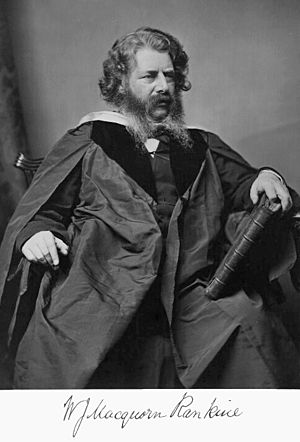Macquorn Rankine facts for kids
Quick facts for kids
William John Macquorn Rankine
|
|
|---|---|

William John Macquorn Rankine
|
|
| Born | 5 July 1820 Edinburgh, Scotland
|
| Died | 24 December 1872 (aged 52) Glasgow, Scotland
|
| Nationality | Scottish |
| Alma mater | University of Edinburgh |
| Known for |
|
| Awards | Keith Medal (1854) |
| Scientific career | |
| Fields | Physics, engineering, civil engineering |
| Institutions | University of Glasgow |
| Influenced | Pierre Duhem |
William John Macquorn Rankine FRSE FRS ( 5 July 1820 – 24 December 1872) was a Scottish mechanical engineer who also contributed to civil engineering, physics and mathematics. He was a founding contributor, with Rudolf Clausius and William Thomson (Lord Kelvin), to the science of thermodynamics, particularly focusing on the first of the three thermodynamic laws. He developed the Rankine scale, an equivalent to the Kelvin scale of temperature, but in degrees Fahrenheit rather than Celsius.
Rankine developed a complete theory of the steam engine and indeed of all heat engines. His manuals of engineering science and practice were used for many decades after their publication in the 1850s and 1860s. He published several hundred papers and notes on science and engineering topics, from 1840 onwards, and his interests were extremely varied, including, in his youth, botany, music theory and number theory, and, in his mature years, most major branches of science, mathematics and engineering.
He was an enthusiastic amateur singer, pianist and cellist who composed his own humorous songs.
Images for kids
See also
 In Spanish: William John Macquorn Rankine para niños
In Spanish: William John Macquorn Rankine para niños


